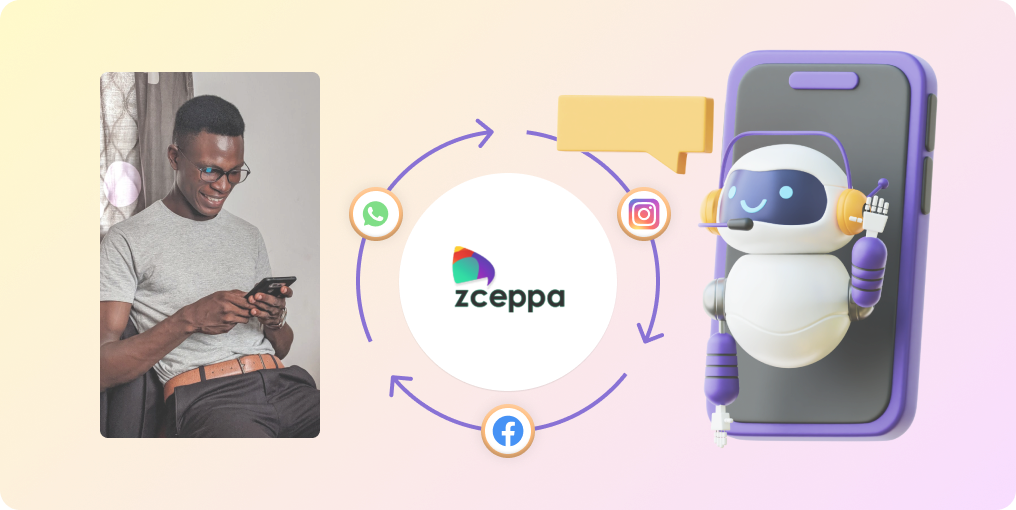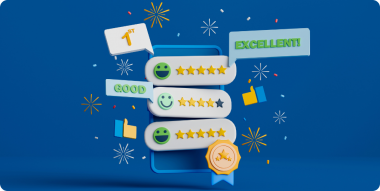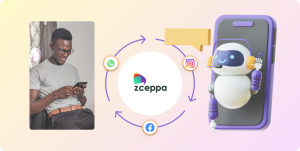Automate Direct Messaging From Search & Social Media Platforms

As a business enterprise, you already know the importance of social media marketing.
In 2023, an estimated 4.9 billion people used social media worldwide. This number is expected to increase to around 5.85 billion users by 2027.
As of mid-2023, the average global online shopping order value from social media platforms reached a whopping 87.5 billion dollars.
It’s becoming increasingly apparent that individuals no longer compartmentalize their online activities but rather navigate between search, social discovery, and direct communication. From conducting a search query to discovering content on social media and then engaging directly via messaging for inquiries or purchases, the journey has become a continuous and interconnected experience.
Therefore, operating these platforms in isolation is no longer sufficient for effective marketing and lead-generation strategies for businesses. Instead, there’s a growing recognition of holistic strategies that span across these formerly siloed channels to effectively engage with audiences and drive meaningful interactions throughout the entire customer journey.
Did You Know?
Business leaders have reported a 67% increase in sales through the assistance of chatbots.
90% of businesses witnessed faster complaint resolution due to the implementation of chatbots.
This article explores how businesses can leverage the power of direct messaging automation to achieve a continuum where search—discovery—engagement followed by messaging (ultimately converting to sales) is the natural order of the day.
Leveraging Direct Messaging for Customer Acquisition and Conversion
There are 3 R’s of direct messaging- responsiveness, relevance, and re-engagement. By leveraging these aspects, businesses can carve out a secure spot in the sales funnel, ensuring they remain visible and valued throughout the customer journey. Let’s see how-
1. Responsiveness
Unlike other forms of communication, direct messaging stands out for its in-the-moment immediacy, often reflecting high intent from the user. It allows businesses to promptly engage with leads, addressing inquiries, concerns, or expressions of interest in real time.
Whether providing timely answers to questions or offering assistance, being responsive in direct messaging can significantly influence lead conversion rates. Moreover, the ability to react promptly to lead interactions helps keep the conversation flowing smoothly, preventing potential leads from losing interest or seeking solutions elsewhere.
2. Relevance
Personalization is key in today’s communication, and direct messaging provides an ideal platform for delivering relevant content and information to leads.
By tailoring messages to match the specific interests, preferences, and pain points of individual leads, businesses can create more meaningful connections and increase the likelihood of conversion. It allows for the customization of messages based on lead demographics, behavior, and past interactions, ensuring that the information provided is not only timely but also resonates with the recipient on a personal level.
3. Re-engagement
Customer Acquisition is not just about making initial contact; it’s about building and nurturing relationships over time. Whether it’s following up on previous conversations, sharing relevant updates or offers, or simply checking in to see how leads are doing, re-engagement through direct messaging keeps the lines of communication open and strengthens the bond between businesses and leads.
All of this is possible because of automation. By providing relevant information tailored to the user’s needs and context, it effectively closes the loop in the conversation. By embracing the unique attributes of direct messaging automation, businesses can effectively capture leads and drive meaningful interactions with their audience.
| Good Read: Harness Direct Messaging to Boost Engagement & Conversions from Search & Social Media Marketing |
Daily Application of Automation in Direct Messaging
Direct messaging (DM) automation uses AI-driven technologies like chatbots and automated messaging systems to streamline and enhance customer interactions on social media platforms. There are a plethora of benefits and use cases of direct messaging automation.
It enables businesses to handle a high volume of inquiries efficiently and around the clock. This improves customer satisfaction by providing instant assistance and frees up valuable human resources for more complex tasks.
Secondly, automated chatbots instantly greet website visitors or social media users, initiating a conversation and guiding them through the lead capture process. Automation also ensures consistency in messaging and branding, eliminating the risk of human error or inconsistency in responses. This helps build a strong and reliable brand image across various communication channels.
However, when businesses resort to impersonal mass outreach, they miss out on the chance to truly connect. Direct messaging offers a fantastic opportunity to add that personal touch, and it’s an efficient move to seize it. By delving into user data and behavior, they can craft messages, recommendations, and offers that resonate on a personal level, making the interaction feel genuine and meaningful.
Did You Know?
People want to hear from brands, but 58% say they get frustrated with messaging that’s generic or inconsistent.
Brands that use personalized push notifications see a 9% increase in user retention.
Let’s see how automation helps with various stages of the customer journey-
Product Information
Automated responses can provide detailed information about products or services in response to lead inquiries. For instance, in the automobile industry, interested buyers often ask about specific models, colors, prices & availability of spare parts through direct messages. So, an automated message can instantly provide the relevant details, along with applicable promotions and discounts. This not only saves time for both the business and the lead but also ensures consistency in the information provided.
Appointment Hours & Booking
Direct messaging automation can facilitate appointment scheduling by allowing leads to check availability and book appointments directly within the messaging platform. An automated system can display available time slots, confirm bookings, and even send reminders to both the lead and the business ahead of the scheduled appointment.
Payments
Automation can also streamline the payment process by integrating payment gateways directly into the messaging platform. Leads can receive invoices, make payments, and receive confirmation—all within the same messaging thread. Automated payment reminders can be sent to leads who have pending payments, reducing the likelihood of payment delays and improving cash flow for the business.
Test Reports & Status Updates
In industries such as healthcare or automotive, where test reports or service statuses are important for leads, automation can provide real-time updates on the status of tests, orders, or service requests. Automated messages can inform leads when their test results are ready, provide progress updates on their order status, or notify them of any delays or issues encountered.
By leveraging automation in direct messaging for these use cases, businesses can enhance customer engagement, streamline processes, and ultimately drive better results in lead capturing and conversion.
Overcoming Common Pitfalls for Using Automation
Businesses must navigate common pitfalls and challenges when harnessing automation for direct messaging in social media marketing to ensure success. Let’s look at some common challenges and identify critical solutions.
Risk of Over-Reliance on Automation
Relying too heavily on automation risks creating impersonal interactions. However, this challenge can be overcome by infusing human elements into messaging strategies. This can include regular monitoring of automated messages to ensure they align with the brand’s voice and values and providing opportunities for customers to connect with a live representative when needed.
Potential Failure To Adequately Protect and Handle Customer Data
More than 40% of users have concerns over the potential misuse of their personal information. Ensuring strict compliance with data privacy regulations and implementing robust security measures will build customer trust and protect their sensitive information.
Ineffective Automation Workflows
When automation workflows are ineffective, they may lead to disjointed sequences of messages or actions that do not effectively guide users through a coherent journey. To address this, businesses should focus on optimizing their workflows. This involves mapping out customer journeys and refining sequences based on user feedback, ultimately creating a smoother and more meaningful customer experience.
Additionally, as a proactive measure, businesses should regularly monitor and optimize automated messages. This ongoing process enables the timely identification of any issues and facilitates real-time data-driven adjustments to improve overall performance.
How to Synergize Personalization and User Consent?
The importance of personalization in marketing cannot be overstated, especially when coupled with obtaining customer consent. In fact, on average, personalization boosts companies’ growth rates by 6-10%.
Automation tools allow businesses to segment their audience based on demographics, interests, or behaviors. This helps send personalized messages beyond just addressing recipients by name and includes tailored product suggestions, exclusive offers, or relevant content based on previous purchases or interests.
However, it’s critical that this personalization should be done ethically and with the customer’s explicit consent. Customers feel more comfortable sharing their information when they know how it will be used and have control over their preferences. This is how you can maintain the synergy-
- Provide a clear opt-in/opt-out mechanism for customers to control their preferences and the use of their data.
- Implement robust data security measures, such as encryption and secure storage, to safeguard customer information against unauthorized access or breaches.
- Conduct regular audits and assessments of data handling processes to help identify and address potential vulnerabilities.
- Adhere to relevant data protection laws, such as the General Data Protection Regulation (GDPR) and The India Digital Personal Data Protection Act 2023 (DPDPA).
- Offer your customers the ability to access, update, or delete their data upon request.
The Future of Direct Messaging Automation
The future of direct messaging automation holds exciting possibilities as businesses continue to leverage emerging trends and advancements. We can expect increased hyper-personalization through AI-driven chatbots, enhanced integration with CRM systems for seamless customer experiences, and the rise of interactive messaging formats like video and voice.
The potential impact of AI and other technologies on direct messaging automation is also immense. AI-powered chatbots will become more sophisticated, offering more human-like interactions. Integration with machine learning algorithms will enable predictive messaging, delivering personalized content and product recommendations in real time. Furthermore, adopting voice assistants and augmented reality (AR) technologies will create immersive and interactive messaging experiences.
But the best part? Platforms like Zceppa are consolidating these capabilities into a unified solution, paving the way for a new era of customer engagement and brand interaction.
Good Read: How Zceppa Interact Helped Maximize Lead & Conversions From Google Business Messages
Conclusion
In summary, direct messaging is the best bet for customer communication as an extension of their social media strategy. And, of course, given its scale and volume, a world without automation seems impossible.
Therefore, businesses can enhance customer relationships by embracing direct messaging automation and adopting personalization strategies while being careful about user data privacy and protection.
However, agility in responding to customer queries remains paramount. Leveraging DMs and automation-enabled solutions like Zceppa allows businesses to navigate these challenges without compromising on core tasks, ensuring a seamless and efficient business operation.
Signup for a free trial
Zceppa’s products empower your business to win every mobile-first consumer interaction across the buying journey.



